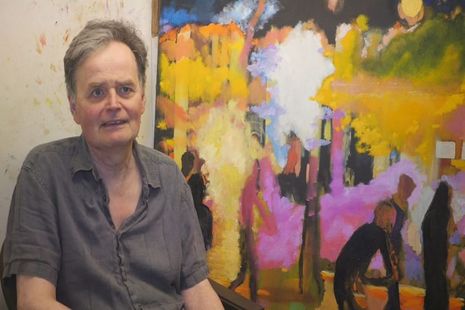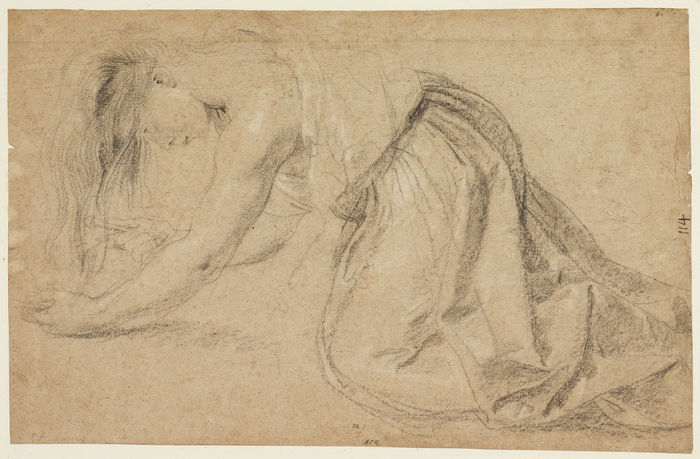Memoirs of an artist’s daughter
Elsie Hayward reflects on growing up surrounded by canvases, and how it has helped her normalise the writers she studies

My dad is an artist, and I have inherited none of his talent. This becomes abundantly clear whenever I think it would be nice to make someone a homemade birthday card. But then again, none of my siblings have any either, so clearly artistic skill has been drowned somewhere in the gene pool, along with his blue eyes. Instead, all four of us have dark eyes and a way with words, like my mum. She was the one who read to me throughout my childhood (and into my teenage years, if we’re being honest), and who gave me poetry (a scrapbook of her favourites for my fifteenth birthday). But I am still an artist’s daughter, and this has still been one of the best possible kinds of training for life as a Cambridge student.
“Thanks to my dad, I have grown the confidence to try and grapple with what is necessarily out of my reach, to form some kind of useful opinion on what is so much bigger than me”
The greatest lesson has to be an unwavering commitment to one’s discipline. My dad has multiple sclerosis and very limited mobility, but you’re kidding if you think that would stop him from painting. As my mum always says, if you took away all his supplies, he would scratch cave pictures on the walls. He paints because it would be impossible for him not to, so the rest of his life fits around it. The walls of our living room are each stacked several canvases deep. My mum jokes that it’s like an Edgar Allen Poe short story – the walls are moving in on us. He shouts out a warning if you walk past something that’s still wet, but while probably having paint on his trousers, hands, and occasionally forehead. He sits in a fold-out chair in his studio – or as my mum still calls it, the utility room – with his back against the washing machine, and the pictures piled higgedly-piggedly under a cold and flickering light. I always hoped I’d prove to be as obsessive about literature as he is about painting when it counted the most.
And then, every so often, he will ask for the pictures to be brought out. My mum and I will lug some cumbersome canvases through to the living room and arrange them where he can view them all most effectively. Nothing quite prepares you for this, to see them out in the light, where you can take several paces back and try to drink them in. My dad does magic with shape and colour. What you see in each canvas is undeniably living people, even if there are merely a few marks to suggest a figure. The colours are more intense than in any scene of this world, and yet still perfectly right. Each one is a world that draws you in, whether you want it or not. Sometimes I ask him what they show, and very often it is a war zone, or the aftermath of some disaster or atrocity, but, otherwise it is my mum in the bath, with my sister as a baby, or it is a beach scene with us as children. And then, inevitably, he will ask me what I think, and I will have to come up with something intelligent to say. No question in a supervision has felt quite so important. Thanks to my dad, I have grown the confidence to try and grapple with what is necessarily out of my reach, to form some kind of useful opinion on what is so much bigger than me.
“I’m not precious about getting stuck into analysing a great poem, because I know my dad takes knives to paintings when he isn’t happy”
To me, artists are real people, ones who ruin their clothes with pigment and irritate their spouses by ordering more canvas when there’s no space for the last lot. I don’t think the writers I study are gods, because they probably got ink stains everywhere and left their papers in a mess. I am lucky – because I grew up in a house that was cluttered with art, I understand that it is both supremely important and also just a part of our lives that we must get by alongside. It lifts us up but is also right down here on earth. I’m not precious about getting stuck into analysing a great poem, because I know my dad takes knives to paintings when he isn’t happy. We can’t all be artist’s daughters, but we need more art in the living rooms of ordinary houses, even if it isn’t physical canvases. More children need to be brought up on it.
And I have learned that, like all of us, I have a right to stand before art and have thoughts. I go to the Fitzwilliam and murmur the names of these great artists, which are gifts that my dad has given me, and summon the courage to tell whoever is with me what I think. And I take photos for my dad. Whenever I am where there are pictures, I’m there for both of us.
Matthew Hayward’s work can be found online at www.haywardart.co.uk, on Instagram @matthewlaurencehayward, or in an upcoming exhibition at the @ground_gallery_wilton.
 Comment / Plastic pubs: the problem with Cambridge alehouses 5 January 2026
Comment / Plastic pubs: the problem with Cambridge alehouses 5 January 2026 News / Cambridge businesses concerned infrastructure delays will hurt growth5 January 2026
News / Cambridge businesses concerned infrastructure delays will hurt growth5 January 2026 News / New movement ‘Cambridge is Chopped’ launched to fight against hate crime7 January 2026
News / New movement ‘Cambridge is Chopped’ launched to fight against hate crime7 January 2026 News / AstraZeneca sues for £32 million over faulty construction at Cambridge Campus31 December 2025
News / AstraZeneca sues for £32 million over faulty construction at Cambridge Campus31 December 2025 Interviews / You don’t need to peak at Cambridge, says Robin Harding31 December 2025
Interviews / You don’t need to peak at Cambridge, says Robin Harding31 December 2025










